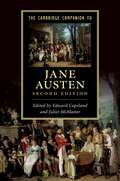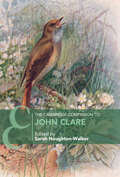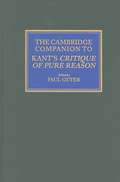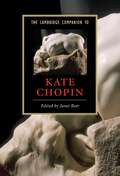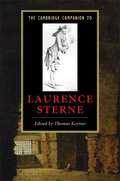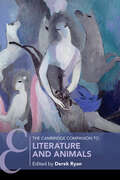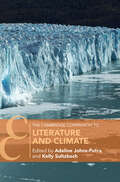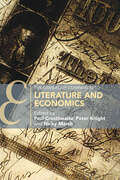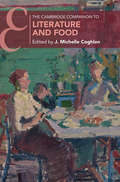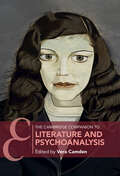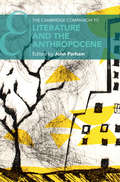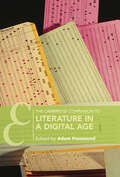- Table View
- List View
The Cambridge Companion to James Baldwin
by Michele ElamThis Companion offers fresh insight into the art and politics of James Baldwin, one of the most important writers and provocative cultural critics of the twentieth century. Black, gay, and gifted, he was hailed as a 'spokesman for the race', although he personally, and controversially, eschewed titles and classifications of all kinds. Individual essays examine his classic novels and nonfiction as well as his work across lesser-examined domains: poetry, music, theatre, sermon, photo-text, children's literature, public media, comedy, and artistic collaboration. In doing so, The Cambridge Companion to James Baldwin captures the power and influence of his work during the civil rights era as well as his relevance in the 'post-race' transnational twenty-first century, when his prescient questioning of the boundaries of race, sex, love, leadership, and country assume new urgency.
The Cambridge Companion to James Joyce
by Derek AttridgeIncluding several new and revised essays, reflecting increasing emphasis on Joyce's politics, this Companion focuses on the importance of his engagement with Ireland, and the changes wrought by gender studies on criticism of his work. The second edition features essays by an international team of leading scholars geared to provoking thought and discussion. Supplementary reading lists and an extended bibliography will offer readers the necessary tools for additional informed exploration of Joyce. First Edition Hb (1990): 0-521-33014-9 First Edition Pb (1990): 0-521-37673-4
The Cambridge Companion to Jane Austen
by Edward Copeland Juliet Mcmaster"Jane Austen's stock in the popular marketplace has never been higher, while academic studies continue to uncover new aspects of her engagement with her world. This fully updated edition of the acclaimed Cambridge Companion offers clear, accessible coverage of the intricacies of Austen's works in their historical context, with biographical information and suggestions for further reading. Major scholars address Austen's six novels, the letters and other works, in terms accessible to students and the many general readers, as well as to academics. With seven new essays, the Companion now covers topics that have become central to recent Austen studies, for example, gender, sociability, economics, and the increasing number of screen adaptations of the novels"--"The image that Henry Austen creates - at odds with the evidence that both Austen's letters and her publishing decisions offer of her professionalism - is precisely the one that so annoyed Henry James, according to Brian Southam: 'the myth of the inspired amateur, the homely spinster who put down her knitting needles to take up her pen'. That myth, and others like it, have prevented subsequent readers from understanding that, for Austen, being a professional writer was, apart from her family, more important to her than anything else in her life. Austen wrote when opportunities for women to publish had never been greater, and from her childhood her aim was to see her works in print. She collected her juvenilia in volumes made to resemble published books as closely as possible"--
The Cambridge Companion to Jewish American Literature
by Hana Wirth-Nesher Michael P. KramerJewish Americans produced some of the most important writing in the U. S. in the twentieth century. This Companion addresses the distinctive Jewish American contribution to American literary criticism, poetry and popular culture. It establishes the broadest possible context for the discussion of Jewish American identity as it intersects with the corpus of American literature. Featuring a chronology and guide to further reading, the volume is valuable to scholars and students alike.
The Cambridge Companion to John Clare (Cambridge Companions to Literature)
by Sarah Houghton-WalkerThe fascinations of John Clare's life are manifold. A labouring-class poet and naturalist, he was lionised in the early 1820s but spent his final decades incarcerated in asylums. In this Companion leading scholars illuminate Clare's rich life and writing, situating each within a range of critical contexts. Essays rooted in discourses as diverse as ecocriticism, aesthetics, religion, health, and time are accompanied by explorations of the construction of the idea (including the self-identity) of Clare through writing and images. The collection also traces influences upon Clare, and considers the ways in which he has influenced subsequent poets in turn. The volume includes a chronology and an invaluable guide to further reading, and provides students with a firm grounding in Clare's writings and his critical reception: this is an indispensable guide to the poet and his work.
The Cambridge Companion to John Donne
by Achsah GuibboryThe Cambridge Companion to John Donne, first published in 2006, introduces students (undergraduate and graduate) to the range, brilliance, and complexity of John Donne. Sixteen essays, written by an international array of leading scholars and critics, cover Donne's poetry (erotic, satirical, devotional) and his prose (including his Sermons and occasional letters). Providing readings of his texts and also fully situating them in the historical and cultural context of early modern England, these essays offer the most up-to-date scholarship and introduce students to the current thinking and debates about Donne, while providing tools for students to read Donne with greater understanding and enjoyment. Special features include a chronology; a short biography; essays on political and religious contexts; an essay on the experience of reading his lyrics; a meditation on Donne by the contemporary novelist A. S. Byatt; and an extensive bibliography of editions and criticism.
The Cambridge Companion to John Dryden
by Steven N. ZwickerJohn Dryden, Poet Laureate to Charles II and James II, was one of the great literary figures of the late seventeenth century. This Companion provides a fresh look at Dryden's tactics and triumphs in negotiating the extraordinary political and cultural revolutions of his time. The newly commissioned essays introduce readers to the full range of his work as a poet, as a writer of innovative plays and operas, as a purveyor of contemporary notions of empire, and most of all as a man intimate with the opportunities of aristocratic patronage as well as the emerging market for literary gossip, slander and polemic. Dryden's works are examined in the context of seventeenth-century politics, publishing and ideas of authorship. A valuable resource for students and scholars, the Companion includes a full chronology of Dryden's life and times and a detailed guide to further reading.
The Cambridge Companion to John Updike
by Stacey OlsterJohn Updike is one of the most prolific and important American authors of the contemporary period, with an acclaimed body of work that spans half a century and is inspired by everything from American exceptionalism to American popular culture. This Companion joins together a distinguished international team of contributors to address both the major themes in Updike's writing as well as the sources of controversy that Updike's writing has often provoked. It traces the ways in which historical and cultural changes in the second half of the twentieth century have shaped not just Updike's reassessment of America's heritage, but his reassessment of the literary devices by which that legacy is best portrayed. With a chronology and bibliography of Updike's published writings, this is the only guide students and scholars of Updike will need to understand this extraordinary writer.
The Cambridge Companion to Jonathan Swift
by Christopher FoxThe Cambridge Companion to Jonathan Swift is a specially commissioned collection of essays. Arranged thematically across a range of topics, this 2003 volume will deepen and extend the enjoyment and understanding of Jonathan Swift for students and scholars. The thirteen essays explore crucial dimensions of Swift's life and works. As well as ensuring a broad coverage of Swift's writing - including early and later works as well as the better known and the lesser known - the Companion also offers a way into current critical and theoretical issues surrounding the author. Special emphasis is placed on Swift's vexed relationship with the land of his birth, Ireland; and on his place as a political writer in a highly politicised age. The Companion offers a lucid introduction to these and other issues, and raises questions about Swift and his world. The volume features a detailed chronology and a guide to further reading.
The Cambridge Companion to Jorge Luis Borges
by Edwin WilliamsonJorge Luis Borges (1899 1986) was one of the great writers of the twentieth century and the most influential author in the Spanish language of modern times. He had a seminal influence on Latin American literature and a lasting impact on literary fiction in many other languages. However, Borges has been accessible in English only through a number of anthologies drawn mainly from his work of the 1940s and 1950s. The primary aim of this Companion is to provide a more comprehensive account of Borges's oeuvre and the evolution of his writing. It offers critical assessments by leading scholars of the poetry of his youth and the later poetry and fiction, as well as of the 'canonical' volumes of the middle years. Other chapters focus on key themes and interests, and on his influence in literary theory and translation studies.
The Cambridge Companion to Kafka
by Julian PreeceFranz Kafka's writing has had a wide-reaching influence on European literature, culture and thought. The Cambridge Companion to Kafka, offers a comprehensive account of his life and work, providing a rounded contemporary appraisal of Central Europe's most distinctive Modernist. Contributions cover all the key texts, and discuss Kafka's writing in a variety of critical contexts such as feminism, deconstruction, psycho-analysis, Marxism, Jewish studies. Other chapters discuss his impact on popular culture and film. The essays are well supported by supplementary material including a chronology of the period and detailed guides to further reading, and will be of interest to students of German, European and Comparative Literature, Jewish Studies.
The Cambridge Companion to Kant's Critique of Pure Reason
by Paul GuyerImmanuel Kant's Critique of Pure Reason, first published in 1781, is one of the landmarks of Western philosophy, a radical departure from everything that went before and an inescapable influence on all philosophy since its publication. This Companion is the first collective commentary on this work in English. The seventeen chapters have been written by an international team of scholars, including some of the best-known figures in the field as well as emerging younger talents. The first two chapters situate Kant's project against the background of continental rationalism and British empiricism, the dominant schools of early modern philosophy. Eleven chapters then expound and assess all the main arguments of the Critique. Finally, four chapters recount the enormous influence of the Critique on subsequent philosophical movements, including German Idealism and Neo-Kantianism, twentieth-century continental philosophy, and twentieth-century Anglo-American analytic philosophy. The book concludes with an extensive bibliography.
The Cambridge Companion to Kate Chopin
by Janet BeerAlthough she enjoyed only modest success during her lifetime, Kate Chopin is now recognised as a unique voice in American literature. Her seminal novel, The Awakening, published in 1899, explored new and startling territory, and stunned readers with its frank depiction of the limits of marriage and motherhood. Chopin's aesthetic tastes and cultural influences were drawn from both the European and American traditions, and her manipulation of her 'foreignness' contributed to the composition of a complex voice that was strikingly different to that of her contemporaries. The essays in this Companion treat a wide range of Chopin's stories and novels, drawing her relationship with other writers, genres and literary developments, and pay close attention to the transatlantic dimension of her work. The result is a collection that brings a fresh perspective to Chopin's writing, one that will appeal to researchers and students of American, nineteenth-century, and feminist literature.
The Cambridge Companion to Latin Love Elegy
by Thea S. ThorsenLatin love elegy is one of the most important poetic genres in the Augustan era, also known as the golden age of Roman literature. This volume brings together leading scholars from Australia, Europe and North America to present and explore the Greek and Roman backdrop for Latin love elegy, the individual Latin love elegists (both the canonical and the non-canonical), their poems and influence on writers in later times. The book is designed as an accessible introduction for the general reader interested in Latin love elegy and the history of love and lament in Western literature, as well as a collection of critically stimulating essays for students and scholars of Latin poetry and of the classical tradition.
The Cambridge Companion to Laurence Sterne
by Thomas KeymerBest known today for the innovative satire and experimental narrative of Tristram Shandy (1759-67), Laurence Sterne was no less famous in his time for A Sentimental Journey (1768) and for his controversial sermons. Sterne spent much of his life as an obscure clergyman in rural Yorkshire. But he brilliantly exploited the sensation achieved with the first instalment of Tristram Shandy to become, by his death in 1768, a fashionable celebrity across Europe. In this Companion, specially commissioned essays by leading scholars provide an authoritative and accessible guide to Sterne's writings in their historical and cultural context. Exploring key issues in his work, including sentimentalism, national identity, gender, print culture and visual culture, as well as his subsequent influence on a range of important literary movements and modes, the book offers a comprehensive new account of Sterne's life and work.
The Cambridge Companion to Lesbian Literature
by Jodie MeddThe Cambridge Companion to Lesbian Literature examines literary representations of lesbian sexuality, identities, and communities, from the medieval period to the present. In addition to providing a helpful orientation to key literary-historical periods, critical concepts, theoretical debates and literary genres, this Companion considers the work of such well-known authors as Virginia Woolf, Adrienne Rich, Audre Lorde, Alison Bechdel and Sarah Waters. Written by a host of leading critics and covering subjects as diverse as lesbian desire in the long eighteenth century and same-sex love in a postcolonial context, this Companion delivers insight into the variety of traditions that have shaped the present landscape of lesbian literature.
The Cambridge Companion to Literature and Animals (Cambridge Companions to Literature)
by Derek RyanThe Cambridge Companion to Literature and Animals surveys the role of animals across literary history and opens conversations on what literature can teach us about more-than-human life. Leading international scholars comprehensively explore how engaging with creatures of various kinds alters our understanding of what it means to write and read, and why this is important for thinking about a series of cultural, ethical, political, and scientific developments and controversies. The first part of the book offers historically rooted arguments about medieval metamorphosis, early modern fleshiness, eighteenth-century imperialism, Romantic sympathy, Victorian racial politics, modernist otherness and contemporary forms. The second part poses questions that cut across periods, concerning habitat and extinction, captivity and spectatorship, race and (post-)coloniality, sexuality and gender, religion and law, health and wealth. In doing so, this companion places animals at the centre of literary studies and literature at the heart of urgent debates in the growing field of animal studies.
The Cambridge Companion to Literature and Climate (Cambridge Companions to Literature)
by Kelly Sultzbach Adeline Johns-PutraInvestigating the relationship between literature and climate, this Companion offers a genealogy of climate representations in literature while showing how literature can help us make sense of climate change. It argues that any discussion of literature and climate cannot help but be shaped by our current - and inescapable - vantage point from an era of climate change, and uncovers a longer literary history of climate that might inform our contemporary climate crisis. Essays explore the conceptualisation of climate in a range of literary and creative modes; they represent a diversity of cultural and historical perspectives, and a wide spectrum of voices and views across the categories of race, gender, and class. Key issues in climate criticism and literary studies are introduced and explained, while new and emerging concepts are discussed and debated in a final section that puts expert analyses in conversation with each other.
The Cambridge Companion to Literature and Economics (Cambridge Companions to Literature)
by Peter Knight Nicky Marsh Paul CrosthwaiteIn recent years, money, finance, and the economy have emerged as central topics in literary studies. The Cambridge Companion to Literature and Economics explains the innovative critical methods that scholars have developed to explore the economic concerns of texts ranging from the medieval period to the present. Across seventeen chapters by field-leading experts, the book highlights how, throughout literary history, economic matters have intersected with crucial topics including race, gender, sexuality, nation, empire, and the environment. It also explores how researchers in other disciplines are turning to literature and literary theory for insights into economic questions. Combining thorough historical coverage with attention to emerging issues and approaches, this Companion will appeal to literary scholars and to historians and social scientists interested in the literary and cultural dimensions of economics.
The Cambridge Companion to Literature and Food (Cambridge Companions to Literature)
by J. Michelle CoghlanThis Companion provides an engaging and expansive overview of gustation, gastronomy, agriculture and alimentary activism in literature from the medieval period to the present day, as well as an illuminating introduction to cookbooks as literature. Bringing together sixteen original essays by leading scholars, the collection rethinks literary food from a variety of critical angles, including gender and sexuality, critical race studies, postcolonial studies, eco-criticism and children's literature. Topics covered include mealtime decorum in Chaucer, Milton's culinary metaphors, early American taste, Romantic gastronomy, Victorian eating, African-American women's culinary writing, modernist food experiments, Julia Child and cold war cooking, industrialized food in children's literature, agricultural horror and farmworker activism, queer cookbooks, hunger as protest and postcolonial legacy, and 'dude food' in contemporary food blogs. Featuring a chronology of key publication and historical dates and a comprehensive bibliography of further reading, this Companion is an indispensible guide to an exciting field for students and instructors.
The Cambridge Companion to Literature and Psychoanalysis (Cambridge Companions to Literature)
by Vera J. CamdenThe Cambridge Companion to Literature and Psychoanalysis explains the link between literature and psychoanalysis for students, critics and teachers. It offers a twenty-first century resource for defining and analyzing the psychoanalytic dimensions of human creativity in contemporary society. Essays provide critical perspectives on selected canonical authors, such as William Shakespeare, Jane Austen, Virginia Woolf, Toni Morrison, and James Baldwin It also offers analysis of contemporary literature of social, sexual and political turmoil, as well as newer forms such as film, graphic narrative, and autofiction. Divided into five sections, each offering the reader different subject areas to explore, this volume shows how psychoanalytic approaches to literature can provide valuable methods of interpretation. It will be a key resource for students, teachers and researchers in the field of literature and psychoanalysis as well as literary theory.
The Cambridge Companion to Literature and Religion
by Susan M. FelchEach essay in this Companion examines one or more literary texts and a religious tradition to illustrate how we can understand both literature and religion better by looking at them in tandem. Unlike most literature and religion books, which tend to focus on Christianity and take a highly theoretical approach inappropriate for non-specialists, The Cambridge Companion to Literature and Religion offers an accessible treatment of both Dharmic and Abrahamic traditions. It provides close readings of texts rather than surveys of large topics, making it an ideal resource for undergraduate and graduate students of literature and religion.
The Cambridge Companion to Literature and the Anthropocene (Cambridge Companions to Literature)
by John ParhamThe Anthropocene is a proposed geological epoch marking humanity's alteration of the Earth: its rock structure, environments, atmosphere. The Cambridge Companion to Literature and the Anthropocene offers the most comprehensive survey yet of how literature can address the social, cultural, and philosophical questions posed by the Anthropocene. This volume addresses the old and new literary forms - from novels, plays, poetry, and essays to exciting and evolving genres such as 'cli-fi', experimental poetry, interspecies design, gaming, weird, ecotopian and petro-fiction, and 'new' nature writing. Studies range from the United States to India, from Palestine to Scotland, while addressing numerous global signifiers or consequences of the Anthropocene: catastrophe, extinction, 'fossil capital', warming, politics, ethics, interspecies relations, deep time, and Earth. This unique Companion offers a compelling account of how to read literature through the Anthropocene and of how literature might yet help us imagine a better world.
The Cambridge Companion to Literature and the Environment
by Louise WestlingThe Cambridge Companion to Literature and the Environment is an authoritative guide to the exciting new interdisciplinary field of environmental literary criticism. The collection traces the development of ecocriticism from its origins in European pastoral literature and offers fifteen rigorous but accessible essays on the present state of environmental literary scholarship. Contributions from leading experts in the field probe a range of issues, including the place of the human within nature, ecofeminism and gender, engagements with European philosophy and the biological sciences, critical animal studies, postcolonialism, posthumanism, and climate change. A chronology of key publications and bibliography provide ample resources for further reading, making The Cambridge Companion to Literature and the Environment an essential guide for students, teachers, and scholars working in this rapidly developing area of study.
The Cambridge Companion to Literature in a Digital Age (Cambridge Companions to Literature)
by Adam HammondLiterature has experienced two great medium shifts, each with profound implications for its forms, genres, and cultures: that from orality to writing, and that from writing to printing. Today we are experiencing a third shift, from printed to digital forms. As with the previous shifts, this transformation is reconfiguring literature and literary culture. The Cambridge Companion to Literature in the Digital Age is organized around the question of what is at stake for literary studies in this latest transition. Rather than dividing its chapters by methodology or approach, this volume proceeds by exploring the major categories of literary investigation that are coming under pressure in the digital age: concepts such as the canon, periodization, authorship, and narrative. With chapters written by leading experts in all facets of literary studies, this book shows why all those who read, study, and teach literature today ought to attend to the digital.

